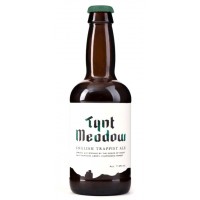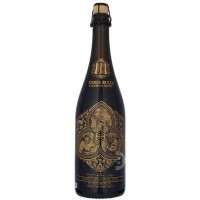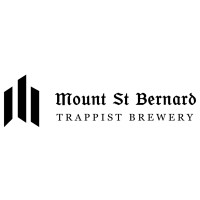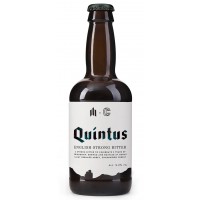

Mount Saint Bernard Abbey Tynt Meadow
starstarstarstar_halfstar_border 3,64
Strong Ale - 7.4 º - 38 IBU
Tynt Meadow English Trappist Ale Trappist beers tend to be named after the place in which the mona ...ot of land on which monastic life was refounded here in the Midlands almost two centuries ago. Being part of the great Trappist tradition, we’ve chosen to produce a strong dark ale, but one ...
 98 Prices
98 Prices 
Bierbrouwerij De Koningshoeven Three Rules of Authentic Trappist
starstarstarstarstar_border 3,80
Belgian Dubbel - 7.4 º - 26 IBU
Three Rules of Authentic Trappist Trappist worden vereist iets bijzonders. Dit meesterwerk, gebrouw ...t die een Trappist onderscheiden van conventioneel abdijbier. Deze regels vormen niet alleen de basis van hun bier, maar zijn ook de hoeksteen van hun bestaan. Regel 1 – Het product moet w ...
 13 Prices
13 Prices 

Tynt Meadow Quintus 330ml
starstarstarstarstar_border 3,85
Extra-Strong Bitter - 5.2 º
Quintus English Strobg Bitter Two great British breweries collaborated to produce Quintus, an Engl ... Brewery and Round Corner Brewing in Leicestershire. Two thousand litres of Quintus were brewed in October on-site at Mount Saint Bernard Trappist Brewery (MSB) in Coalville, with the successful ...
 1 Price
1 Price You make the grass grow for the cattle and the plants to serve man’s needs, that he may bring forth bread from the earth and wine to cheer man’s heart.
Psalm 104
Beer should be liquid bread, not coloured water.
Belgian Trappist Saying
Monastic Life and Work
We live by the rule of Saint Benedict, a lifestyle summed up by our motto Ora et labora – ‘Pray and Work’. As monks, we strive to earn our living by the work of our hands. We don’t receive any subsidies from the Church for our living expenses, or for the upkeep of our historic buildings. That means we depend on reliable sources of income to continue our life of contemplation, to welcome guests, and to help those in need.
‘Idleness’, says Saint Benedict, ‘is the enemy of the soul’. Work provides balance in our life. It helps us keep both feet firmly on the ground. We aspire to make our work creative and joyful, and to perform it to the highest standard. We go about our tasks as quietly as possible. For monks, work is one part of the contemplative endeavour. A way of praising God, and experiencing solidarity with the rest of mankind. Performed in Christ’s name, the act of work can itself become simple, silent prayer.
Members of the community work on carpentry, pottery, bookbinding, and candle making. Others make rosaries and greetings cards, and there is a monastic shop selling our produce and a wide range of artwork and books. A lot of effort is expended on the maintenance and upkeep of our buildings and grounds. We undertake the sort of work common to any family or community, like cooking, cleaning, and laundry. We also look after our old and sick brethren at home, a task which is always given high priority. Several brothers are appointed to work in the guest house, which is open to pilgrims and retreatants who, for a shorter period, wish to share in our monastic rhythm of prayer and peace.
Our community’s main work has always been the cultivation of the land. Cistercians have always been farmers. At the beginning of the twenty-first century, it became increasingly apparent that farming was no longer viable at Mount Saint Bernard. Developments in modern agriculture, combined with the consistently low price of milk, made it hard to run our dairy farm profitably. In 2013, we reached a point where it seemed irresponsible to continue.
The Brewery
When the inviability of farming became obvious, we began to look for an alternative source of income and common work. We aimed to establish an industry in which many of us could be involved. Brewing met our requirements. After much careful research and community discussion, we decided to revive the Abbey’s beer-making tradition. We know for a fact that beer was brewed here in the nineteenth century and, contrary to widespread perception, monastic brewing has never been confined only to the Low Countries. Past visitors to our community have left accounts expressing their liking for the monks’ table beer. Although the historic recipe has been lost, we’re certain that the ale we’re brewing now is at least as delicious and nurturing.
In 2017-18 we relocated our refectory, kitchen, and laundry to provide space for the installation of a new artisanal brewery. We will keep the volume of production relatively small. Just enough to meet our expenses and support our charitable commitments. As of 2018, the brewery is our principal field of labour. All the work, from brewing to bottling and packaging, is done by the monks.
All this resulted from much preparation and research. Once we had decided to set up a brewery, we began to practise on a small home brewing kit. We’ve experimented with a range of different beers to acquire experience, and to work towards a final recipe. The monks of Norcia, Saint-Wandrille, and Zundert have taught us a lot, and were generous in sharing their own brewing experience. We’ve received invaluable advice from the eleven other Trappist breweries, and from the International Trappist Association. We’ve also benefited from the kindness and counsel of several local brewers.
Cistercians esteem the value of simplicity. Simplicity doesn’t stand for a thing done simply, or cheaply, but rather represents a distillation of complexity. It is about processing and ordering a rich, varied reality in such a way that the result seems self-evident: ‘This is how it has to be!’ We see this quality at work in the way the early Cistercians built their churches, composed their music, wrote their sermons, cultivated their land. We hope you’ll recognise it, too, in the way we brew our beer.
Monks have always been great readers, and sometimes great writers too. The label we’ve designed for Tynt Meadow draws on a twelfth-century Cistercian script, subtly developed by Brother Anselm Baker, an early monk of our community who was a noted artist. A quill has also been used to draw our brewery’s logo, a sketch of the lancet windows characteristic of our church. If you get hold of a Tynt Meadow coaster you’ll notice another design inspired by the simple stroke of a pen.
We’re happy to share the work of our hands with you. We’re proud of the ale we’ve made, and have made it with joy. We hope you enjoy it. Despite living a life apart, monks are open to the world. We carry the world’s anxieties and hopes in our prayers. We’re always glad to welcome guests who turn up on our doorstep.
The monks of old had a saying: Patet porta, cor magis. ‘The door is open, the heart even more so.’ By inviting you to taste Tynt Meadow, we offer you a taste of our life.

























































